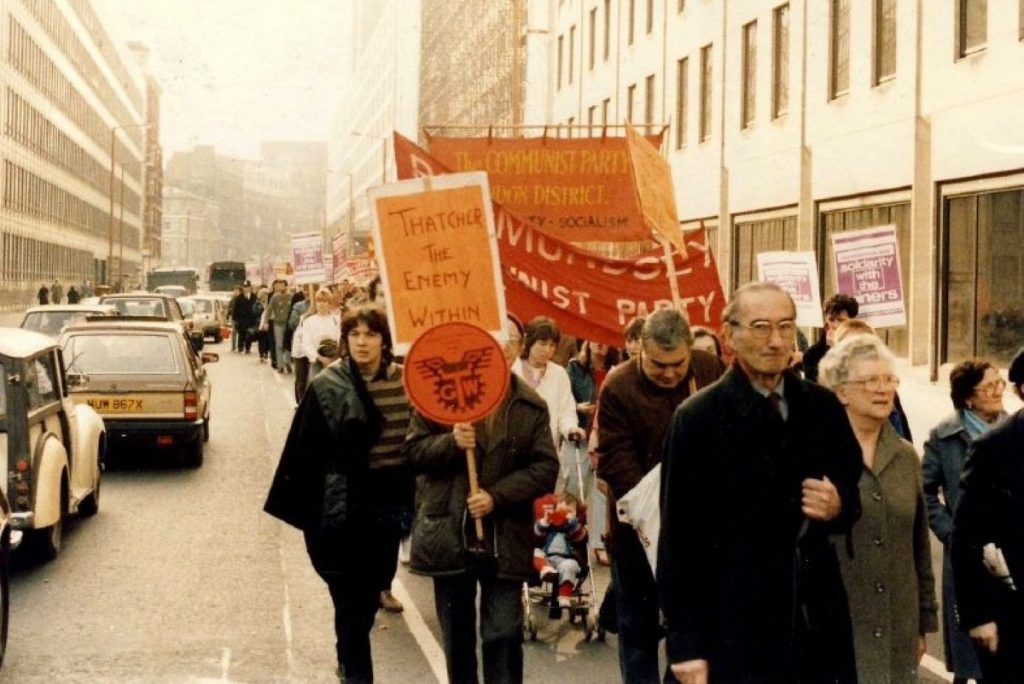End of the miners’ strike: The day hard men wept
By Robert Mercer-Nairne
On March 3rd, 30 years ago, Britain's striking miners gave up their fight. With colliery and union banners held high and brass bands playing, men, joined by their wives and families, marched back to pitheads which had seen only maintenance work for the best part of a year. Melting flakes from intermittent snow flurries disguised tear-stained cheeks. Unconditional surrender had been the terms forced on them. In silent ululation, each wife present could only be glad that her months of struggle to make do on handouts and mounting debt were over. But none marching that day had any illusions. This was a funeral, not a celebration. Their way of life was over.
It is hard for those who didn't live through the decade before Margaret Thatcher arrived in No 10 to remember how close to collapse our nation came. The state was nearly bankrupt. Without the unexpected bounty of North Sea oil it would have been. The post-war consensus, which had bound managers, unions and politicians in symbiotic lock-step – an outgrowth of the war-time economy – was straining like a pressure cooker under the heat of economic reality. With all the dexterity of a slow-witted giant, the politically mandated could not cope with the complex subtleties of the market. So when the Organization of the Petroleum Exporting Countries quadrupled the price of oil, inflation blew off the pressure cooker's lid.
In those invisible corridors of power that run like nerves through every body politic, at first in a whisper and then in a shout, the expressed realisation grew that something had to be done. As one administration after another was trampled under the apocalyptic hooves of the approaching horsemen the cry went out: oh for heaven's sake, let's give that woman a chance!


For years, Thatcher and those closest to her had been saying that the job of government was to legislate, not to run things. She insisted that if Britain was to thrive again then the heavy hand of the state bureaucracy had to be lifted off the British people so that they could engage with one another as they saw fit and prosper. She was certain that in a complex economy the decisions of the many would always lead to a better outcome than the decisions of the few. Otherwise the government would just end up corrupted by vested interests with political power out to protect their own turf.

May 1979, the election that brought to power the government that led to the miners' strike, was a vote of huge change. In May 2015, Britain once again has the opportunity to vote. And once again the status quo is breaking apart.
Under Nigel Farage, the United Kingdom Independence party has attracted many to its flag concerned that the country they knew is being transformed in ways they do not like by forces outside their control. In Scotland, the Scottish people look as though they will opt for rule by a single party, but crucially one they perceive to be closer to them both physically and psychologically. Liberalism appears to have lost its political bite as voters worry about the mounting cost of welfare excess at home and harsh illiberality abroad.
The two main political parties, Labour and Conservative, have been or shortly will be ousted from another part of the British union (they never were a force in Northern Ireland and are hardly one in Wales, the notional Welsh Labour party not withstanding). The Labour leader, as much as his union backers, seems to have a disintegrating rapport with his historical supporters, while the Conservative party continues to obsess about Europe and appears to have forgotten what it means to be conservative.
So what whispers might be racing around those invisible corridors of power? I suspect they will be imbued with an air of panic. We are, I think, closer to the start of the 1970s in political tempo than at their end, at least as far as the United Kingdom is concerned. Scotland already has its lady and I suspect will be happy to stick with her. It is England that faces the greatest challenge. Will it be Boris Johnson, as London's former mayor, who is called upon to lead an independent England when it has become clear to everyone that the United Kingdom no longer exists?
Who knows, but if resisted, the changes ahead are sure to be painful. Just ask an ex-miner.
Robert Mercer-Nairne is the author of the new novel about the battle between Thatcher and the unions, The Storytellers: Metamorphosis
The opinions in Politics.co.uk's Comment and Analysis section are those of the author and are no reflection of the views of the website or its owners.












